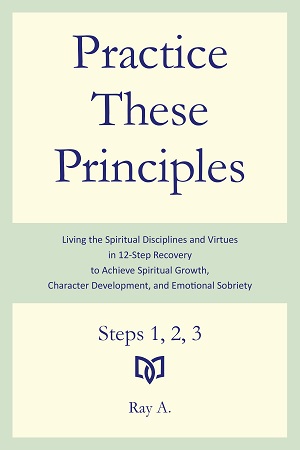
"This consideration of the relationship between virtue and discipline in the working of the Steps can help us gain a better understanding of the process of character development in the program. We practice the principles in all our affairs to do good and, by doing good, to become good, so that we can do still more good. This doing and becoming is how we grow in virtue and thus in good character; it is the seed and the fruit of our spiritual growth.
The same process of habit formation that is at work in the acquisition of good character traits is at work in the acquisition of defective ones. Defects of character are deeply ingrained bad habits acquired through repeated action over long periods of time. These traits are the very opposite of the virtues. They fill our character with the attitudes, tendencies, and propensities to ill which cause our discontent and at times our ruin. Whereas virtues are ways of living life well, vices or character defects are ways of living life poorly.
We can see character development then as a process of replacing vices with virtues, character defects with character strengths, deeply ingrained bad habits with equally deeply ingrained good habits. This is why the saying that AA stands for “Attitude Adjustment” makes perfect sense. Like choice, attitude is a buzzword in our culture. So much of what we do seems to hinge on our attitude and on the choices that we make. But attitude as currently used is really just a more popular word for an older and richer term that forms part of the virtue tradition, and this is disposition. And this, our attitude or disposition, the way that we lean spiritually, morally, and emotionally, is precisely what the program seeks to affect and fundamentally alter.
In AA, this change commences with the virtue of willingness. This is the key that opens the door to all the other virtues for the alcoholic. Its connection with attitude adjustment or change in disposition is readily apparent. To dispose is defined as 'to put into a willing or receptive frame of mind.' That is, as regards virtue, to be willing is to have our will disposed or inclined to the good, to be well- rather than ill-disposed. The initial adjustment and turning point takes place in Step 1, where we experience an internal shift from willfulness to willingness. We yield and let go of resistance and defiance. We become ready to do the simplest yet for us the hardest thing to do: to ask for help and accept direction.
As we grow in recovery and we practice the spiritual principles of the program—disciplines and virtues—these attitude adjustments multiply and accumulate until our spiritual orientation and prevailing frame of mind has undergone a radical transformation and we have developed a habitual inclination toward the good in all we do. The virtues take hold in our character. We now live in the solution. Doing the right thing for the right reason and with the right emotion becomes almost second nature. We have entered a new spiritual dimension. Yet it all begins with nothing more than a simple willingness to give the program an honest try."
– From "Virtue and Character Development," pp. 31–33
For more PTP123 Excerpts, please click on link.